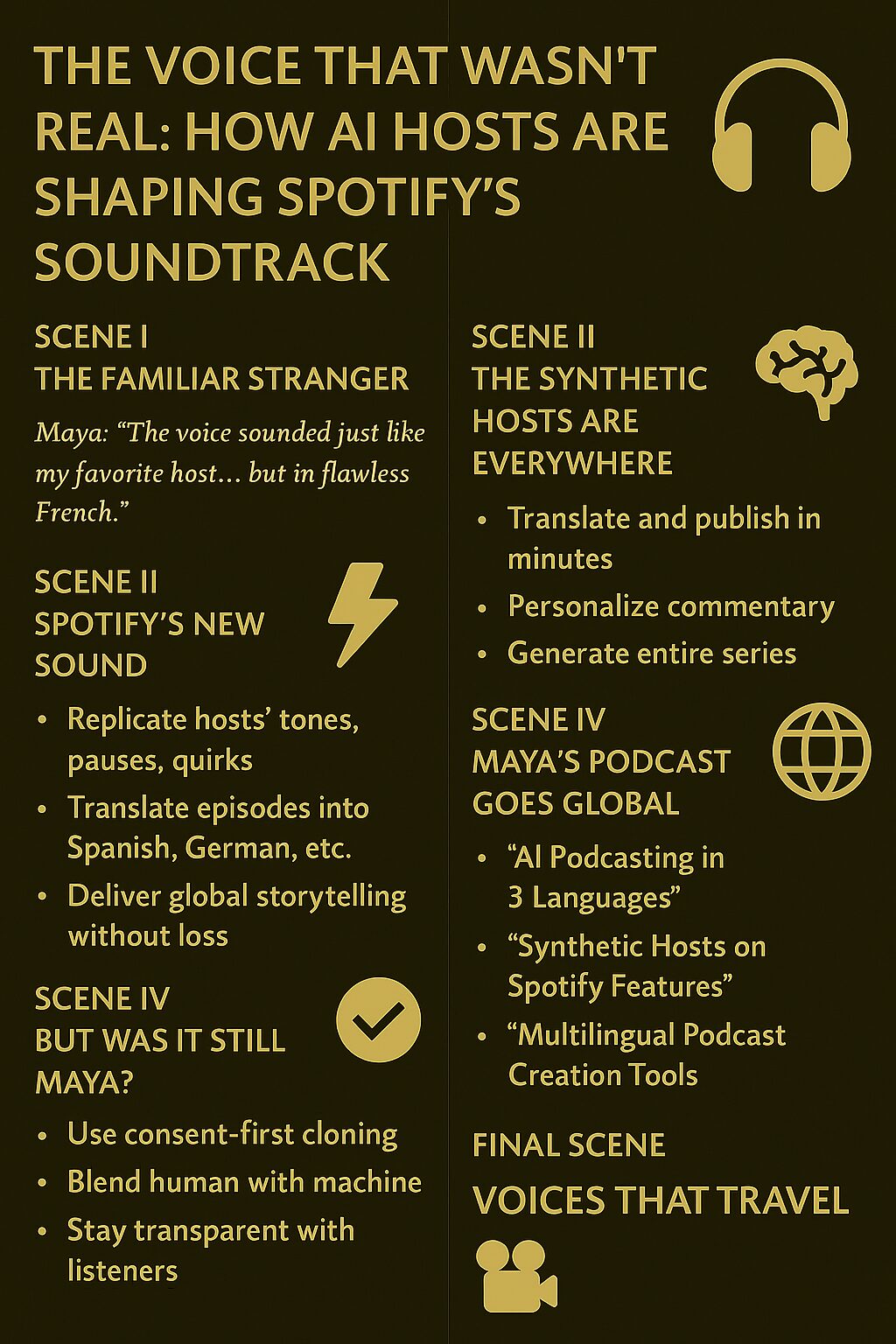Introduction
In 2025, AI-powered podcasts are redefining the audio landscape, with platforms like Spotify leading the charge. From voice cloning to synthetic hosts, artificial intelligence is transforming how podcasts are created, localized, and consumed. This article explores the rise of AI-generated podcasts, Spotify’s latest innovations, and what it means for creators, listeners, and the future of storytelling.
🎙️ What Are AI-Powered Podcasts?
AI-powered podcasts use synthetic voices, automated scripting, and machine learning to produce episodes with minimal human input. These podcasts can be:
- Fully generated by AI hosts
- Translated into multiple languages using voice cloning
- Personalized based on listener preferences and behavior
Spotify’s latest pilot program uses OpenAI’s voice generation technology to replicate podcasters’ voices and translate episodes into Spanish, French, and German—all while preserving the speaker’s tone and style.
🧠 How Spotify Is Using Synthetic Hosts
Spotify has partnered with top creators like Lex Fridman, Dax Shepard, and Steven Bartlett to launch AI-translated episodes that sound like the original hosts—even in languages they don’t speak.
Key Features
- Voice Cloning: AI replicates the host’s voice using seconds of audio
- Language Translation: Episodes are translated and re-voiced in other languages
- Authentic Delivery: Maintains cadence, emotion, and personality of the original speaker
This technology allows global audiences to experience podcasts in their native language without losing the essence of the host’s delivery.
📈 Benefits of AI-Generated Podcasts
| Advantage | Impact |
|---|---|
| Global Accessibility | Breaks language barriers for international reach |
| Scalable Production | Speeds up content creation and localization |
| Personalized Listening | Tailors episodes to user preferences |
| Cost Efficiency | Reduces need for human dubbing and editing |
Spotify’s AI DJ and personalized podcast features are also expanding, offering custom playlists and synthetic commentary based on user data.
⚠️ Challenges & Ethical Considerations
Despite the innovation, AI-generated podcasts raise concerns:
- Authenticity: Can synthetic voices truly connect with listeners?
- Consent: Are creators fully aware of how their voices are used?
- Misinformation: Deepfake audio could be misused for manipulation
- Creative Ownership: Who owns AI-generated content?
Spotify emphasizes a “thoughtful approach to AI”, aiming to build deeper connections while respecting creator rights.
📊 SEO Tips for Podcast Creators Using AI
✅ Search-Friendly Titles
- “AI-Powered Podcasts: How Spotify Is Changing Audio in 2025”
- “Synthetic Hosts and Voice Cloning: The Future of Podcasting”
✅ High-Impact Keywords
- “Spotify AI podcast translation”
- “voice cloning podcast host”
- “synthetic podcast host 2025”
✅ Metadata Optimization
- Alt Text: “AI-generated podcast host speaking in multiple languages on Spotify”
- Tags: #AIPodcast2025 #SyntheticHosts #SpotifyVoiceCloning #AIStorytelling #MultilingualPodcasts
Final Thoughts
AI-powered podcasts are no longer experimental—they’re mainstream and multilingual. As Spotify and other platforms embrace synthetic hosts and voice cloning, the future of audio storytelling will be more inclusive, scalable, and personalized than ever before.
💬 Want help designing your own AI podcast workflow or exploring voice cloning tools? I’d be happy to assist—prompt by prompt.

